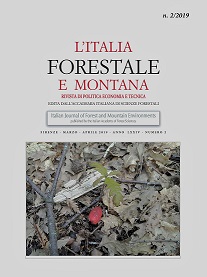Published
2019-08-21
Keywords
- forest management,
- complex adaptive systems,
- forest research
Abstract
The rapidity of the global change and the complexity of the phenomena involved make any forecast of future environmental conditions rather uncertain: the only thing we can be sure of is that the future will be different from the present and that most ecosystems will be living in conditions never experienced before. The awareness of an uncertain but certainly different future motivates the search for new solutions for a sustainable management of forest systems. Accepting that the future will be different from both the past and the present makes it necessary to develop flexible management strategies to promote the proper adaptation: distinctively, it is expedient to fully recover the experimental character of silviculture, continuously monitoring the reactions of forest stands in order to introduce timely adjustments. From a scientific point of view, one of the most important premises under this perspective has been to consider the forest as a complex adaptive system. From this approach, some guiding principles for forest management in times of global change have been derived worldwide. However, managing a forest to increase its adaptability and resilience to global change still is a challenge for silvicultural research. Under such a distinctive perspective, this note highlights, in the form of a commented discussion, critical issues about experimental procedures in silviculture and relevant operational themes.


